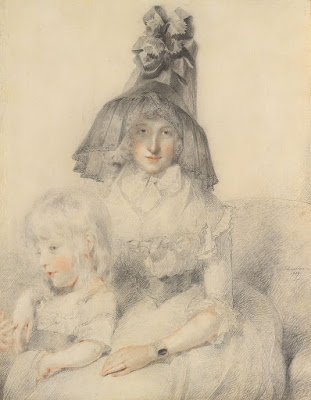The musical life of King George III and Queen Charlotte does not seem promising for an evening's entertainment at first, but the two were highly cultured with music playing a big role in their private and public lives. Ensemble Hesperi's 2022 project, Then I play'd upon the Harpsichord interwove music of the period with diary entries from the period. At a performance at Six Fitzroy Square, Ensemble Hesperi, Mary-Jannet Leith (recorders), Magdalena Loth-Hill (Baroque violin), Miriam Kazcor (Baroque flute), Florence Petit (Baroque cello), Elias Sibley (theorbo/guitar) and Thomas Allery (harpsichord), were joined by Rowan Pierce (soprano), Nathaniel Mander (fortepiano) and actor Miranda Keeling, when the evening was filmed, and the resulting film is available from Ensemble Hesperi's website.
Miranda Keeling reads extracts from Queen Charlotte's own diary as well as from the fascinating memoirs of her lady-in-waiting, Charlotte Papendiek. Charlotte Papendiek's father came to Britain with Princess Charlotte as page, barber and hairdresser and his daughter, Charlotte married Christopher Papendiek, a violinist, flautist and court musician to King George III. In 1833 she wrote extensive memoirs of her time in the Queen's service; they are unfinished and were not published until 1887.
 |
| Charlotte Papendiek with her eldest son Frederick a drawing by Thomas Lawrence, 1789, |
The programme is based on research by recorder player Mary-Jannet Leith, so we hear music that the Queen loved, that she and the King heard, including works performed on a visit by the eight-year-old Mozart, who dedicated a sonata to the Queen. Her music master was JC Bach, and he led her own group of chamber musicians, the Queen's Band. Concerts and musical evenings were regularly organised, and from the diary entries it is clear that besides these more formal events, music simply threaded its way through their lives.
The musical side to things is full of delightful variety, and it is not just the well-known, we hear a violin sonata by Jane Mary Guest, piano teacher to Princess Amelia. The music features works loved by the Queen, including pieces by JS Bach and Graun from her beautifully bound collection. During King George's illness, it was to the music of Handel he turned and one of the pieces we hear is the German aria by Handel, Meine Seele hört im Sehen.
There are songs by Linley and Arne, Scots songs that Queen Charlotte used to sing, and music by KF Abel who was amongst the Queen's musicians and who played the viola da gamba, referred to by the Queen as 'that detestable instrument'. There is plenty of musical and tonal variety, whilst Thomas Allery plays the harpsichord Nathanel Mander plays the fortepiano, and we have both Mary-Jannet Leith's recorders and Miriam Kazcor's Baroque flute, alongside Magdalena Loth-Hill's Baroque violin, Florence Petit's Baroque cello and Elias Sibley on theorbo and guitar, plus soprano Rowan Pierce. The results are imaginative and engaging, stylishly performed and, perhaps most importantly, everyone seems to be enjoying themselves.
There is no attempt at Georgian re-creation, beyond performing the programme in a fine Georgian townhouse, instead, we simply enjoy some superbly stylish historically informed music making. The narrative sections are imaginatively put together, taking on a journey through the King and Queen's lives, beautifully and naturally read by Miranda Keeling, who has a way of bringing the voices of Queen Charlotte and Charlotte Papendiek to life. Papendiek, writing we presume for her children and grand-children rather than for publication, could be quite sharp at times and her observations make a delightful complement to the music.
The project was not only supported by the Continuo Foundation but Mary-Jannet Leith was awarded the British Society for Eighteenth-Century Studies Georgian Papers Programme Fellowship for 2021, where the full project was called "Then I play'd upon the Harpsichord": The Role of Music in the Georgian Royal Household.
Full details of the video from Ensemble Hesperi's website, and there are plans to tour the programme later this year, so watch this space.
Never miss out on future posts by following us
The blog is free, but I'd be delighted if you were to show your appreciation by buying me a coffee.
Elsewhere on this blog
- A love of telling stories: Norwegian composer Bjørn Morten Christophersen on setting Charles Darwin's 'On the Origin of Species' to music - interview
- Finding his way: Opera Rara's revival of Donizetti's relatively early L'esule di Roma showed a composer finding his own voice - opera review
- Giovanni Legrenzi: Rinaldo Alessandrini and Concerto Italiano explore motets by one of Venice's most prominent composers - record review
- The Library of a Prussian Princess: Ensemble Augelletti at the Newbury Spring Festival - concert review
- Meditating, listening & letting the music unfold: Syrian composer & musician Maya Youssef on the inspirations behind her music - interview
- Cautionary Tales: the current cohort of Young Artists from the National Opera Studio in an evening of contemporary opera - opera review
- Temple Song: Kate Royal, Christine Rice & Julius Drake in Brahms, Schumann and Weill - concert review
- Silence, texture and atmosphere: music by John Luther Adams, Kaija Saariaho, Judith Weir, and Gary Carpenter at Royal Academy of Music's Fragile Festival - concert review
- Casta Diva: trumpeter Matilda Lloyd showing just what her instrument can do with elegant yet dazzling accounts of Italian bel canto arias - concert & record review
- Stop Motion Music: Edinburgh-based composer Neil T. Smith chats about his new disc, exploring the smaller-scale works he has written from the last eight years - interview
- Henryk Górecki's Symphony of Sorrowful Songs: an astonishing visual treat from Isabella Bywater at ENO - opera review
- Home












No comments:
Post a Comment